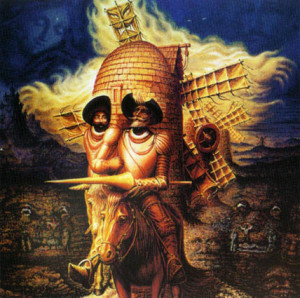The Book Club met last Tuesday, and I am at a loss for a central point or theme. Surely, I could fill it up with words and analysis of femininity and mythology, but somehow after the discussion that doesn’t seem right. I assure that there will be a couple of paragraphs about how women are portrayed in this novel, or the multitude of ways they are portrayed, plus questions concerning Don Quixote’s virtue/genuineness. But I will also write down Katie’s theory as to Don Quixote’s madness, which gives this narrative a bit more clarity.
Blaze opened up the discussion by saying there are various lens we can look through to understand this text. In other books, there are specific lenses the author wants us to look through to see certain injustices within our culture. For example, we look through a lens of class stratification and economic injustice when we read the Great Gatsby. However, looking at The Catcher in the Rye in this same lens may lead you to only judgement of the characters within the book. We look at work labor when we read Steinbeck and we look at race and ethnicity when we Beloved or The House on Mango Street. Every lens is a part of culture but not every lens is a part of literature. With this book, Blaze suggested that there may be every lens available for the reader. Whether you are interested in Philosophy, Anthropology, Class Structures, Hegelian Lordship and Bondage Dialectic, Feminism, History, Mythology, and so on.
In the beginning of this reading, Don Quixote and his squire Sancho come across a chain of galley slaves and guards. Don Quixote listens to each’s misfortune and sentence. Then, he decides to let them free and says:
I deduce that although you are being punished for your faults, the penalties you are about to suffer are not to you liking, and you go to them unwillingly and involuntarily; it might be that the lack of courage this one showed under torture, that on’e need of money, another’s lack of favor, and finally, the twisted judgment of the judge, have been the reason for you ruination, and for not having justice on your side (169).
It can be no surprise Don Quixote freed these slaves despite their sentencing from the King. What this implies is that Don Quixote is going against the monarchy, taking his own power and judgment into his own hands, and once again going against the orders of religion. We can see this by (1) going against the monarch who is divine and (2) Sancho’s free of the Holy Brotherhood.
However, this scene is more intricate than we think. Don Quixote makes sure to hear all of the slaves’s reasons for their condemnation. This is also restated in the quote above when Don Quixote lists each’s reason for their sentence. Foolishly, Don Quixote takes it as a lack of injustice and begins freeing the slaves by taking out the guards. Sancho starts freeing the slaves. In the end they are beaten by the slaves: rocks are thrown, Sancho’s donkey is stolen, and they are left without any food.
Why does this happen? Why are Don Quixote and Sancho beaten. I’d argue it is a clever trick on Cervantes part to illustrate the problems with judgment in our culture. Quixote judges every single slave as wrongly sentence. That these slaves had a lack of justice. This may be true, but who is it for Quixote to decide. They play God and are rewarded by stones and theft of their property.
Since Sancho had warned his master against freeing the slaves and the events turning against them, then Sancho is allotted time to give more advice to his master about future encounters, about honor and valor. Sancho says, “withdrawing is not running away, and waiting is not sensible when danger outweighs hope, and wise men know to save something for tomorrow and not risk everything in a single day” (174). This is sound advice especially to a knight that takes everything he hears as the absolute truth. This advice wasn’t taken warmly by Sancho’s master who mounted his horse without saying a word. Don Quixote is filled with joy from the landscape and within a page their misfortunes turns to fortune.
Perhaps there is meaning in their fortunes turn to misfortune. Remind me to keep an eye out for opposite’s happening, looking out for obvious ironies.
Shifting pace here:
Later on in this section we get another narration from a crazy man in the mountains. Sancho and Don Quixote find him running through the bush half naked preforming “mad acts.” They find a shepherd who knows a small history of the man and helps our two boys find him in a sane manner to recount his story. However, the madman’s one condition is that he is not interrupted because the moment that happens is the very same moment the madman’s narration ends (183). This is the second time this condition has been put on telling a story. Once with Sancho’s joke which Don Quixote interrupted and this is the second time, which big surprise Don Quixote interrupts. This is a long book, 940 pages long. I can’t tell you how many times this book has been interrupted. This makes me think that Cervantes is calling to the very act reading in this moment. Now I’m not for sure on this, but it seems to me this will keep happening: people’s stories halting due to interruption. Perhaps this is the nature of story telling. Cervantes suggests that while we are in a narration, our own narration keeps going. And once the exterior narration moves our interior own then the two narration become one, which we see in these interruptions. Every time Don Quixote interrupts then the narration or story becomes about him as well. Essentially he forces himself into the story. In the case of the madman describing the woman he loves as loving chilvalric novels…well Don Quixote couldn’t help himself. The consequence is always the same, the story ends.
Funny enough, within the next ten pages Don Quixote decides to go mad, commit mad acts in the sierra, and writes a letter and sends Sancho on his way. Then, Quixote decides in what way he wants to be mad. He goes naked from the waist down, contemplates previous fictional knights and the ways they committed their mad acts, “And there he pondered what he had so often pondered without ever reaching a decision, which was whether it would be better and more appropriate for him to imitate Roland in his excessive madness or Amadis in his melancholy, and talking to himself” (205). It’s astounding to me that the narrator of this book uses the word imitates. It’s so clear and deliberate it’s hard for me to believe in our Don Quixote’s authenticity. Or perhaps, I just don’t know that much about chivalry.
What could be happening is Cervantes is revealing the true nature these knights by revealing their feigned states of madness. Maybe it’s just a show to get attention. It seems possible that this is the time for Quixote to commit his madness acts and send his squire to his lady to restore him to sanity. Who knows? All I know for sure is that Quixote has just compromised his sincere position.
Lastly, I’d like to conclude with Katie’s theory of Quixote’s madness. She said during the meeting that Quixote’s madness amplifies as he loses his sleep. His sanity returns to a degree, too. Just think back to the inn when Quixote drank his potion and slept, puked, and felt great. Sancho has slept any chance he can get and remains relatively sane, stupid, but sane. Think about it, Don Quixote hasn’t slept in days. He didn’t sleep when he was reading the chivalry novels, he slept when he was returned home, and it makes sense that Quixote gets a little more sane with each period of sleep. If only he could sleep for a week straight then maybe he’d come back the way he was before we knew him. But then we wouldn’t have this great big book to read, and I’d have nothing to write about.
No more promises for next time because I can’t seem to guess what we’ll talk about in the book club. It’s a good thing.

